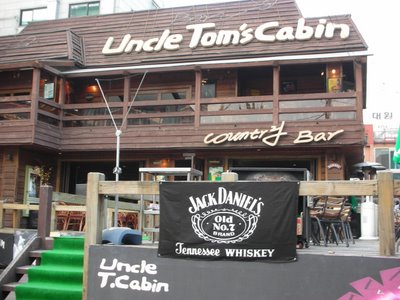
Uncle Tom’s Cabin: Country Bar. Proudly serving Tennessee’s favorite export, Old No. 7 Sour Mash, this waterin’ hole is located in the heart of Seoul’s Apujeong neighborhood. Known as Korea’s “Rodeo Drive”, Apujeong is populated by high-end fashion brand retailers and grand department stores. English speakers in Seoul will see plenty of poorly worded, grammatically incorrect, inadequately punctuated signage. Here, English is a foreign language, after all. But what is more interesting (or sadder) than the silly English mistakes are the cultural gaffes. Perhaps this bar’s owner is wholly ignorant of the historical significance (American) of “Uncle Tom’s Cabin”. Maybe he’s just some guy with a cabin-dwelling uncle named Tom. Naw, it is much more likely this entrepreneur, searching for an apt piece of rural Americana, discovered the title of Harriet Beecher Stowe’s anti-slavery treatise and thought, in Korean, “Gee, that’s a swell name for my American country bar – recognizable, a patch in the American cultural quilt work, pure country.” Assuming the owner is not marketing his bar to attract patrons of the segregationist expatriate set, this title is not malicious. It’s not like naming a stylized Japanese restaurant “Missouri”. Seriously, that place exists here in Seoul. Now that’s just mean. No, this Uncle Tom’s Cabin is the product of cultural illiteracy. Such ignorance is certainly a component of racism. Another component of racism, one that seems less prevalent in this instance and more sinister in the end, is exploitation. Commercializing subjugation is abhorrent. From the abolition of slavery until the civil rights movement (and maybe still today), though, the American cultural landscape is littered with such trash.
Uncle Ben’s Rice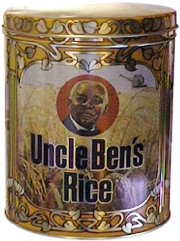
Uncle Ben must be Uncle Tom’s brother. Or maybe his arch rival? They’ve probably got beef. For a serious analysis of Uncle Tom’s metamorphosis from stoic protagonist to derisive pejorative, see Ferris State University’s Museum of Racist Memorabilia. And in the spirit of total disclosure, Uncle Ben’s (the corporation) claims Uncle Ben (the bow-tie wearin’, ear-to-ear smilin’ mascot) was an actual rice farmer, prized for his high-quality rice. I’m sure his family is reaping the windfall from licensing his image to the promotion. Right? Right.
Rastus Ever have a piping hot bowl of Cream of Wheat on a brisk, wintry morn? Me neither. It tastes like shit unless you add some fruit or syrup or other sugary condiment. I assume. I don’t touch the stuff. But even without trying it, we know that it’s cheap and doesn’t have bugs.
Ever have a piping hot bowl of Cream of Wheat on a brisk, wintry morn? Me neither. It tastes like shit unless you add some fruit or syrup or other sugary condiment. I assume. I don’t touch the stuff. But even without trying it, we know that it’s cheap and doesn’t have bugs.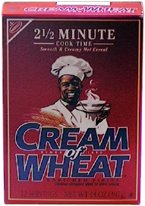
This makes it marginally more appealing than any breakfast that does contain bugs or is too expensive that your broke-ass couldn’t afford it anyway. How is it that Rastus has a white coat and a chef-type hat but doesn’t know what “vitamines” are? He’s clearly achieved a modicum of culinary training. They don’t just give those fucking goofy hats out to anyone
Aunt Jemima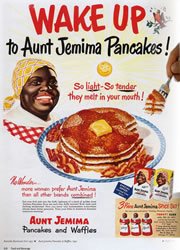 WAKE UP! Mammy be cookin’ breakfast. I wonder if she’s a line cook at Uncle Tom’s Cabin. Aunt Jemima is roundly accepted as one of the most objectionable and racist depictions of African-American women, ever. It’s easy to see why. She is purely one-dimensional (well, technically, she’s 2D, but bear with me). At least Calpurnia had some substance, some meaning, as a loving provider to the Finch family. What’s Aunt Jemima bring to the table? Another cheap, easy, presumably bug free, source of bad carbohydrate calories.
WAKE UP! Mammy be cookin’ breakfast. I wonder if she’s a line cook at Uncle Tom’s Cabin. Aunt Jemima is roundly accepted as one of the most objectionable and racist depictions of African-American women, ever. It’s easy to see why. She is purely one-dimensional (well, technically, she’s 2D, but bear with me). At least Calpurnia had some substance, some meaning, as a loving provider to the Finch family. What’s Aunt Jemima bring to the table? Another cheap, easy, presumably bug free, source of bad carbohydrate calories.
Now I have actually tried these and…they are delicious. I totally agree with the Quaker Oat’s claim from this 1931 Ladies Home Journal advert.
You might not be able to read the fine print, so let me transcribe: “The whole family loves these super-light pancakes, made from the made from the same old plantation recipe Aunt Jemima used when her master was alive.”
Old-world recipes and “easy as toast”?!?! Well that’s like having a Slave In A Box!
As MM Manring exposes in the aforementioned book, Auntie J is also supposed to have been based upon a real woman. In this case, the real Aunt Jemima, unlike Uncle Ben, was actually a freed slave. And I thought she invented the pancake. Can you explain how mixing a batter, pouring it over a griddle and flipping it repeatedly is “easy as toast”? Eggos are easy as toast. Eggo Waffles are toast. Were there no toasters in 1931? Did you have to bake the bread then slice it and then hold it over an open flame? If so, I guess pancakes were “easy as toast”.
Maybe the best part of the Aunt Jemima story is Quaker Oat’s decision to recast her image to be less offensive. That’s right, in 1989, mammy met Oprah and got herself a makeover. Real Classy. And totally NOT racist anymore.
Artist Jon Onye Lockard recasts the Jemima brand more suitably for 21st century America.

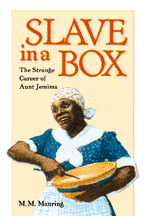
3 comments:
Good to see you flew to the other side of the world and are still bored to tears.
I understand that ignorance isn't an excuse... but with such glaring examples of racism existing in the good old US of A, why don't we cut our Korean brothers a little slack. Perhaps "Uncle Tom's Cabin" of Apujeong is a tribute to the great book that helped kick start the abolishonist movement. Did you ever think of that? Of course you didn't you awful cynic. Keep up the good Photo-journalism.
That looks quite a bit like my Uncle Tom's cabin. What with the astro-turf covered stairs and random, Y-shaped pole erected in the middle of the porch...
Post a Comment